Psychology Sports Quotes
About the Breakthroughs Need Breakdowns Author
Ben Foodman is a licensed psychotherapist & performance specialist. He owns his private practice located in Charlotte North Carolina where he specializes in working with athletes to help them overcome mental blocks (the yips), PTSD, ADD / ADHD and achieve flow states through the techniques of Brainspotting & Neurofeedback. If you are interested in services, use the link here! Enjoy the article below!
Introduction: Important Quotes From The Sport Psychology Field
Athletes, coaches and even sport psychologists regularly turn to one resource to help them reframe negative perceptions of the sport environment, enhance their confidence and learn new ways to enhance their training: psychology sports quotes. Through the process of writing Breakthroughs Need Breakdowns, I used many quotes that influenced my thinking and writing on the subject matter of mental blocks in sports and how to overcome them. Because I found these quotes to be so helpful in both my writing and my work with athletes, I wanted to use the Notes to share those excerpts.
For this issue of the Notes, I am going to review three excerpts that were game changers for my work with athletes. The first psychology sports quote came from The Body Keeps The Score by Bessel Van Der Kolk. This quote gives us an introductory explanation for why traditional sport psychology is not the answer for mental blocks. The second quote comes from the book This Is Your Brain On Sports by David Grand which introduces us to Brainspotting. Finally, the last quote is an excerpt from my new book Breakthroughs Need Breakdowns, which gives us insight as to how we can better understand the sports environment.
Part I. Insight For Athletes In The Body Keeps The Score
In The Body Keeps The Score, author Bessel Van Der Kolk takes us on a journey into the modern science that explains how trauma impacts us. The description of the book is as follows: Trauma is a fact of life. Veterans and their families deal with the painful aftermath of combat; one in five Americans has been molested; one in four grew up with alcoholics; one in three couples have engaged in physical violence. Dr. Bessel van der Kolk, one of the world’s foremost experts on trauma, has spent over three decades working with survivors. In The Body Keeps the Score, he uses recent scientific advances to show how trauma literally reshapes both body and brain, compromising sufferers’ capacities for pleasure, engagement, self-control, and trust. He explores innovative treatments—from neurofeedback and meditation to sports, drama, and yoga—that offer new paths to recovery by activating the brain’s natural neuroplasticity. Based on Dr. van der Kolk’s own research and that of other leading specialists, The Body Keeps the Score exposes the tremendous power of our relationships both to hurt and to heal—and offers new hope for reclaiming lives.
There are many incredible quotes and excerpts that have greatly influenced my work in the field of sport psychology, but one of my favorite quotes is in Chapter 4. Bessel Van Der Kolk makes the following statement: psychologists usually try to help people use insight and understanding to manage their behavior. However, neuroscience research shows that very few psychological problems are the result of defects in understanding; most originate in pressures from deeper regions in the brain that drive our perception and attention. When the alarm bell of the emotional brain keeps signaling that you are in danger, no amount of insight will silence it. I am reminded of the comedy in which a seven-time recidivist in an anger-management program extols the virtue of the techniques he’s learned ‘they are great and work terrific-as long as you are not really angry’. This quote really hits home for me because most athletes have had the experience of sport psychologists telling them to use ‘positive-thinking’ but have had little to no success with this when trying to overcome mental blocks. This is because these are the wrong tools for this issue which is critical for athletes to know.
Part II. The Secret Mental Training Weapon In This Is Your Brain On Sports
In David Grand’s book This Is Your Brain On Sports, the author provides us insight into a new sport psychology tool that can finally help athletes overcome mental blocks. The book is described as follows: This book introduces the breakthrough concept of STSD (Sport Traumatic Stress Disorder). Grand and Goldberg have discovered that STSDs are the cause of most significant performance problems. Performance blocks and anxiety, including the yips, stem from accumulated sports traumas including sports injuries, failures and humiliations. The authors also introduce the Brainspotting Sports Performance System (BSPS) which quickly finds, releases and resolves the sports traumas held in your brain and body. An easy read, THIS IS YOUR BRAIN ON SPORTS is filled with engaging, informative, inspiring stories. These case examples illustrate how professional, elite, collegiate and junior athletes have been freed for good from this silent "epidemic" of performance blocks and anxiety including: the yips, "Steve Blass disease," "Mackey Sasser syndrome," protracted slumps, balking, choking and freezing. THIS IS YOUR BRAIN ON SPORTS provides the answers and the cure for athletes, their coaches and parents about "Beating Blocks, Slumps and Performance Anxiety for Good!" Grand and Goldberg also show how their BSPS can take all athletes to levels they could only heretofore dream of!
One of my favorite quotes in Dr. Grand’s book illustrates why Brainspotting works and how it helps athletes in the following excerpt: Brainspotting Sports Work has very little to do with traditional talk therapy. The belief in talk therapy is that talking about and reliving earlier upsets ultimately helps the client to heal. Talk therapy may uncover upsetting early childhood experiences that contribute to one’s problems in the present, but the treatment is often lengthy and inefficient. Treatment that relies on conscious verbal reporting is problematic because the client often either is unable to articulate the problem or is unaware of it. Athletes struggling with RSPPs (Repetitive Sports Performance Problems) are unable to understand them because the freeze reactions have nothing to do with conscious processes but are instead products of trauma, often long forgotten, that are still unconsciously held in their bodies. Brainspotting Sports Work explores past physical and emotional traumas without consciously rehashing them. As a consequence, we don’t encourage athletes to talk or think through past events. Instead, our model directly targets the places in the athlete’s brain and body where these physical and emotional traumas are frozen. By holding the eye position in place, with the athlete gazing at a pointer, the brain is able to process and release the trauma’s present-day effects.
Part III. Tips On Beating The Yips In Breakthroughs Need Breakdowns
In my new book Breakthroughs Need Breakdowns, I introduce readers to new concepts that help explain what the Yips is and how athletes should actually approach mental skills training. The following is a summary that provides more details on what Breakthroughs Need Breakdowns is all about: Discover the silent threat plaguing athletes worldwide in BREAKTHROUGHS NEED BREAKDOWNS, a compelling narrative non-fiction shedding light on the pervasive impact of the Yips, or Mental Blocks, which silently derail careers, drain organizations, and sow panic throughout the athletic world. Unveiling the deep-rooted trauma behind these psychological barriers, this book offers vital mental health interventions to empower athletes to shatter limitations and reach their peak performance. Through riveting tales from athletes and sport psychologists, embark on an enlightening journey through the neuroscience of the Yips, unlocking pathways to resilience and triumph, while also describing strategies used to enhance mental performance.
In my book, there is one excerpt that took a considerable amount of time to craft but ultimately helps readers really understand important information about the sports environment, and how to leverage this information to their advantage: At their core, sports are stress tests. It does not matter what level of sport competition an athlete participates in, nor what type of sport. In order to pass through the stress test successfully, athletes need to be able to give full mental focus and full physical focus. But like any stress test, if there is an unresolved issue or weakness within the system, the stress test will reveal this. In the case of athletes, the revelation comes in the form of an error signal which can vary from athlete to athlete, but usually is unexpected and to many athletes ‘inexplicable’. This excerpt from the book explains mental blocks such as the Yips & Twisties in more detail, followed by strategies athletes can use to actually permanently get rid of these psychological obstacles and maintain peak mental performance outcomes.






























